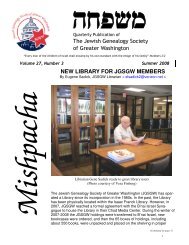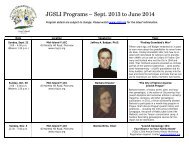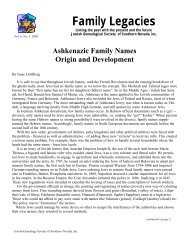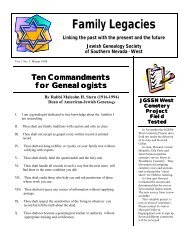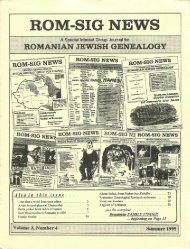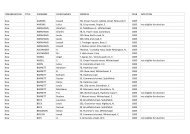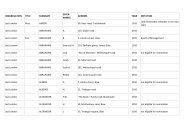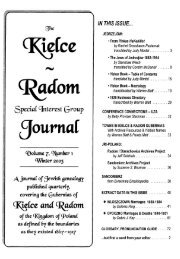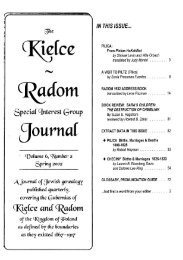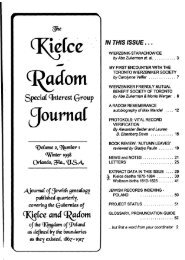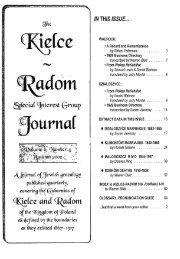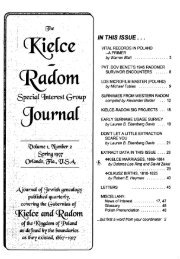THE MEMORIAL BOOK OF PÁPA JEWRY - JewishGen
THE MEMORIAL BOOK OF PÁPA JEWRY - JewishGen
THE MEMORIAL BOOK OF PÁPA JEWRY - JewishGen
You also want an ePaper? Increase the reach of your titles
YUMPU automatically turns print PDFs into web optimized ePapers that Google loves.
and collected in order to maintain ritual judges, butchers, precentors, chazans, and teachers.<br />
There were weddings and bar mitzvas and funerals for the rich and the poor. There were boxes<br />
for charity and each box had a gabbai in charge. There were community leaders and a community<br />
president. Elections were held for all the respected positions; with scheming going on among the<br />
householders and the candidates for the posts, there was great turmoil. Every Shabbat there were<br />
sermons, followed by disputes concerning the sermons. There were local beggars from the town<br />
or from the surrounding villages, and there were also "respectable" international beggars, going<br />
from one country to another, bringing along news and spicy gossip from the life of other<br />
communities that lived the same way, which consequently became the conversational topic of the<br />
synagogue and the beit hamidrash.<br />
This state of affairs characterized our community when the ken of the Shomer was born. It<br />
is difficult to describe exactly how it was created. In the beginning, we did not know anything<br />
about ideology. We did not join the Hashomer Hatzair because we knew the differences between<br />
the different factions of Zionism. We did not have the slightest idea about the very existence of<br />
different trends in Zionism. Only a few of us had certain (rather faint) notions about Zionism at<br />
all. On the other hand, there was something in the air that made our souls receptive to the idea.<br />
It was in 1929 or 1930. Fascism in Italy had already consolidated. Since Mussolini was<br />
not antisemitic, most Jews did not consider it a bad thing. The Nazis in Germany were already<br />
very strong, but the Jews of Hungary still lived in the "Garden of Eden" of economic liberalism.<br />
It is true that Numerus Clausus was in effect and each year the skulls of many Jewish students<br />
were cracked at the universities by members of the antisemitic association "Turul". Our fathers<br />
were reconciled to that. Antisemitism was spiritual, "ideological", and not economic. Livelihood<br />
was still possible. And as a result, the son could be sent to study at a medical school in Italy or<br />
Austria. Nevertheless, we the sons suffered from spiritual antisemitism. In the elementary and<br />
high schools, we learnt Hungarian culture, which became our flesh and bone, although our<br />
schools were Jewish schools. We were taught in Hungarian. At home our parents spoke Yiddish<br />
with each other only when they did not want us to understand. We learnt Hungarian history,<br />
literature, poetry. Our heroes were Hungarian; Kinizsi, Toldi, Hunyadi were our heroes. Petőfi,<br />
Arany, Vörösmarty, Jókai, Mikszáth, Ady, Attila József were the writers and poets that we<br />
admired. Our souls completely identified with the sufferings of the Hungarian people. We used to<br />
sing the national anthem with all our hearts, and on March 15, on the Hungarian day of<br />
independence, we declaimed the Talpra Magyar with firm belief.<br />
Despite that, we were despised by the Hungarians. In their eyes we were "stinking Jews".<br />
The non-Jews did not accept us socially, did not befriend us. We felt humiliated, not needed, we<br />
did not belong. At the same time, the petty intrigues within the community did not interest us. We<br />
did not understand the language of our prayers at the synagogue. We translated the Bible into<br />
Hungarian in the two weekly religious education classes much the same as we translated the<br />
Odyssey from Greek in 6 classes a week. We did not learn Jewish history. We did not have<br />
Jewish heroes. We were distressed, yet filled with anticipation of something, we did not know<br />
what.<br />
One day an issue of the Zsidó Szemle fell into my hands. It was the only Zionist weekly<br />
and it was my first encounter with the Zionist idea. It swept me off my feet completely. It was<br />
exactly what I was looking for: Jewish consciousness, Jewish pride, identity and belonging. My<br />
distress was over. All of a sudden I felt that life was meaningful.<br />
54



